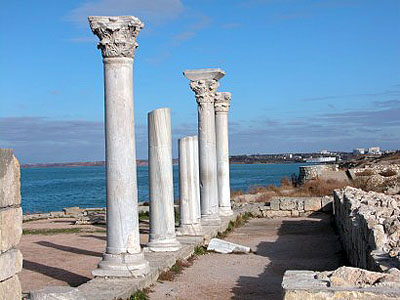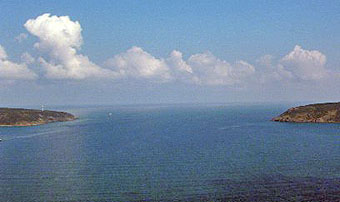
Greek ruins along the Black Sea near Kherson
The Ancient Greeks settled the Black Sea coast a long time before the Russians--or any other Slavic people for that matter--got there, and I mean a very long time ago. There was a initial wave of Greek colonization towards the end of the Greek Dark Ages in the eighth century bce, and then another wave, especially promoted by Athens, in the fifth century bce at the height of Athenian power.
According to Ancient Greek sources, the sea was first called the "Inhospitable Sea" (Pontos Axeinos), because it was difficult to navigate and, guess what, there were "barbarians" living there on the shores. Supposedly after the Greeks, and later the Romans, became more familiar with the Black Sea, the name was changed to the "Hospitable Sea" (Euxeinos Pontos aka Εὔξεινος Πόντος). Legend has it that Jason and the Argonauts set out over the Black Sea to find the Golden Fleece in the land of Colchis (present-day Georgia).
During the Roman Empire, the Romans took over the Greek colonies and added more of their own. The Black Sea became even more important after the founding of the city of Constantinople (330 ce), which became first the capital of the Eastern Roman Empire and then later the Byzantine Empire. With the fall of Constantinople to the Turks in 1453, the Black Sea became, in essence, a "Turkish lake.” From the reign of Peter the Great, the Russians and Turks battled for control of the Black Sea and the straits connecting the Sea with the Mediterranean Sea.

The Black Sea is an inland sea between southeastern Europe and Anatolia. Countries bordering on the Black Sea include Turkey, Romania, Bulgaria, Ukraine, Russia and Georgia. The Black Sea connects to the Mediterranean Sea through, in order, the Bosporus, the Sea of Marmara, the Dardanelles (Hellespont) and then the Aegean Sea. The Sea receives salt water through the Bosporus and fresh water from the rivers flowing into it. It's maximum depth is a bit over seven thousand feet.
Interesting fact: In naval science, the Black Sea is thought to have received its name because of its hydrogen sulfide layer that begins about 200 meters below the surface, and that ends all life from that point downward. In other words, below a depth of about 250-300 feet (deeper near the shore) there is not enough dissolved oxygen to support life.


Bosporus
Black Sea Deluge theory, Noah's Ark, Atlantis?
In 1998, William Ryan and Walter Pitman, geologists at Columbia University, published their evidence, Noah's Flood: New Scientific Discoveries about the Event That Changed History (1998), that a massive flood through the Bosporus occurred about 5,600 bce. This is the simplified deal; don't cite me! The Black Sea was separated from the Mediterranean by the ridge of the Bosporus. As glaciers melted and the ocean level rose, the water flooded over the Bosporus in a spectacular fashion. A huge area of land was inundated, and the Black Sea expanded. Ryan and Pitman wrote:
I have also seen dating of this event to around 7,000 bce. The theory remains an active (contentious?) subject of debate among archaeologists. It is interesting because there has also been evidence discovered to both support and discredit the idea. There is also some evidence that there was a catastrophic flood involving the Caspian Sea flooding eastward. Both of these "deluge" events have been linked to Noah's flood and the disappearance of Atlantis.